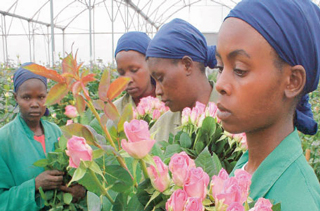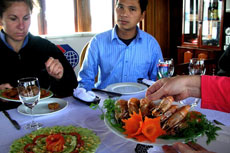Human Flower Project
Tuesday, March 02, 2010
Who’s Protecting Lake Naivasha?
Lake Naivasha is at the center of Kenya’s flower production, but now, despite a self-regulating flower council, the lake’s fish are dying. Can the industry adequately police itself?

Workers at one of the flower farms of the Lake Naivasha region of Kenya: horticulture employs half a million Kenyan people.
Photo: The East African
Kenya’s flower industry, after years of success that have induced many other African nations to jump into floral production, took a big hit last year. According to the East African, income in this sector was down a third last year. Flower council chief Jane Ngige reports that for “the first time in close to 20 years, the flower industry has registered negative growth.”
In the past month there’s been more bad news, the mysterious die-off of more than 1000 fish in Lake Naivasha, where the flower farms are concentrated. Both Kenyan environmentalists and now the national authorities are focussing their investigation on several flower farms, which many say have been flouting standards and polluting the lake.
From what we can tell, the flower industry is completely self-regulated in Kenya, an arrangement that has served many law-abiding farms—and their employees—well. Most Kenyan flowers sell in Europe, where there’s strong demand for produce—including flowers—that’s responsibly grown and traded. But Europe’s flower sales have steeply declined during the 18+month global economic downturn: this blotch on the reputation of Kenyan flowers couldn’t come at a worse time. As well as the health of the lake, there are a reported 500,000 jobs at stake in Kenya’s horticulture sector.
The Kenyan growers association hopes to protect its system of self-regulation (see Ngige’s editorial), but that system seems to have failed. As a native Kentuckian who’s seen what happened when coal operators policed mining, we have to ask, could the Kenyan government—or some other more independent authority—do better? Would it do better?




